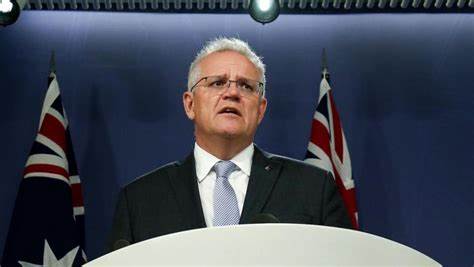Australia is deploying more than 100 police and defence force personnel to Solomon Islands, where anti-government protesters took to the streets in the capital, Honiara, for a second day running in defiance of a lockdown order.
The Australian government said the deployment would support “riot control” and security at critical infrastructure, a day after demonstrators attempted to storm parliament and topple the prime minister, Manasseh Sogavare.
Canberra said the move was in response to a request from Sogavare under an existing security agreement between the two countries, and should not be seen as taking a position in Solomon Islands’ internal affairs.
Sogavare said his government was still in control. “Today I stand before you to inform you all that our country is safe – your government is in place and continues to lead our nation,” Sogavare said on Thursday, adding that those responsible would “face the full brunt of the law.”
Most of the protesters in Honiara are reportedly from the neighbouring island of Malaita. People on the island have long complained of neglect by central government and strongly opposed the decision to switch the country’s diplomatic allegiances from Taiwan to China in 2019.
The protesters defied a 36-hour lockdown imposed in the wake of Wednesday’s unrest and took to the streets again on Thursday. By late evening, thousands of people were out on the streets, as fires burned and plumes of thick black smoke billowed high above the city. Banks, schools, police stations, offices and Chinese-owned businesses were among the buildings reportedly torched and, in some cases, looted.
“There’s mobs moving around, it’s very tense,” one man told AFP.
The Australian prime minister, Scott Morrison, announced his government was deploying 73 federal police officers and 43 Australian defence force (ADF) personnel to Solomon Islands, which lies about 1,000 miles north-east of Australia.
Resurgence of unrest in the Solomons fuelled, in part, by lingering animosity towards Chinese businesses and the 2019 decision to switch diplomatic allegiances from Taiwan to China.
Morrison said it was a time to support “our Pacific family.”
“We have received reports of more buildings burning on the main road in the centre of Honiara, including a large commercial building and a bank branch, and increasing numbers of people on the streets,” Morrison told reporters in Canberra.
The first 23 police officers left Canberra on a Royal Australian Air Force plane on Thursday afternoon. Morrison said the police officers would “support riot control” while additional police and the ADF personnel would “support security at critical infrastructure”.
But Morrison said Australian personnel would stay away from the parliament and the executive buildings of the government, as guarding those facilities was a task for the Solomon Islands police force.
“Our purpose here is to provide stability and security to enable the normal constitutional processes within the Solomon Islands to be able to deal with various issues that have arisen and that be done in a climate of peace, stability and security,” Morrison said. “It is not the Australian government’s intention in any way to intervene in the internal affairs of the Solomon Islands – that is for them to resolve. I’ve made that very clear.”
The Australian foreign minister, Marise Payne, said the Australian diplomatic mission in Honiara remained operational and all staff and their family members were safe. “They are supporting the government in the provision of information about events as they unfold,” she said.
Witnesses posted images on social media of smoke rising from the capital and said Chinese-owned businesses were being targeted. In Beijing, the foreign ministry spokesperson, Zhao Lijian, expressed “grave concern” and called on the Solomon Islands government “to take all necessary measures to protect the safety of Chinese citizens and organisations”.
Solomon Islands, an archipelago nation of around 700,000 people, has struggled repeatedly with ethnic tensions and political violence since gaining independence from Britain in 1978.
Australia led an international police and military force called the Regional Assistance Mission to Solomon Islands that restored peace in the country after bloody ethnic violence from 2003 until 2017.
Sogavare angered many in 2019, particularly leaders of Malaita, Solomon Islands’ most populous province, when he cut diplomatic ties with Taiwan, switching diplomatic allegiance to China instead.
Several hundred demonstrators torched buildings, including a police station, and looted stores on Wednesday after marching on parliament to demand Sogavare’s resignation.
Sogavare ordered an immediate curfew across Honiara, set to run until 7am on Friday, describing the unrest as a “sad and unfortunate event aimed at bringing a democratically elected government down”.
The opposition leader, Matthew Wale, called on Sogavare to step down, saying the unrest would not be quelled by a police-enforced lockdown.
“Regrettably, frustrations and pent-up anger of the people against the prime minister are spilling uncontrollably over on to the streets, where opportunists have taken advantage of the already serious and deteriorating situation,” he said in a statement.
“The 36-hour lockdown is yet another reactionary response that is not the solution to the current situation,” he said.
SOURCE: THE GUARDIAN/PACNEWS













